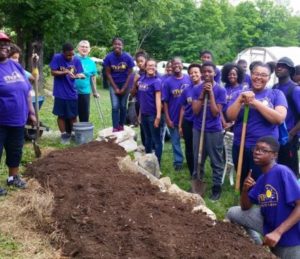Sowing the Seeds of Food Justice
A Guide for Farmers Who Want to Supply Low-Income Communities While Maintaining Financial Sustainability

Youth food justice leaders are experts at promoting healthy food in their own communities. Photo courtesy of Soul Fire Farm
This manual offers strategies and insights to help you run a small farm business that supports the needs of low-income communities.
As much as farmers want to support the community, the community needs our solidarity. About 50 million Americans are food insecure, with half of those individuals living in food deserts, where it’s difficult or impossible to access affordable, healthy food. This lack of access to life-giving food has dire consequences for people.
This manual is drawn from: (1) our experience growing Soul Fire Farm, a family farm working to end racial and economic injustice in the food system; (2) the experiences of our allied farms in the struggle for food justice; and (3) extensive research on resources and best practices for serving low-income communities in the local food and agricultural sector.
Funding for this project was provided by the USDA Sustainable Agriculture Research and Education program. This guide draws extensively from public reports written by the National Sustainable Agriculture Coalition and the Project for Public Spaces. We are deeply grateful for these invaluable resources.
Learn more and download the FREE publication: https://projects.sare.org/information-product/sowing-the-seeds-of-justice-food-manual/ and https://www.soulfirefarm.org/
Kelsie Raucher
Kelsie is from southwest Missouri and grew up on a 150-acre farm helping her family buy and sell horses and cattle. She credits FFA for finding her passion for agriculture and food issues and desiring a career as an “agvocate.” Since coming to Cornell, she has gained interest in local production, global food issues, and environmental impacts of and on agriculture. She joined the Cornell Small Farms Program in May of 2018 and is excited to gain experience to complement coursework in the Agricultural Sciences major and Communication major.
Posted in Small Farms Quarterly

